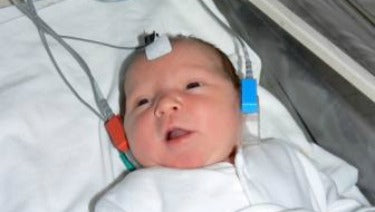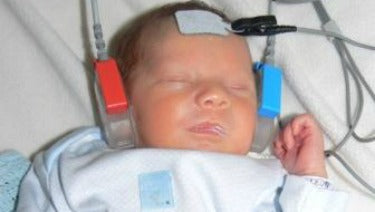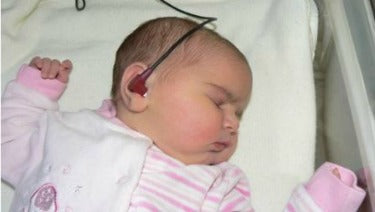Before you bring your newborn home from the hospital, your baby needs to have a hearing screening.
From birth, one important way babies can learn is through listening and hearing. Although most infants can hear fine, 1 to 3 of every 1,000 babies born in the U.S. have hearing levels outside the typical range.
Newborn screening and diagnosis helps ensure all babies who are deaf or hard of hearing are identified as soon as possible. Then, they can receive early intervention services that can make a big difference in their communication and language development.

The American Academy of Pediatrics (AAP) recommends hearing screenings for all newborns. The goal is for all babies to have a newborn hearing screening by one month of age, ideally before they go home from the hospital; identified by 3 months of age and enrolled in early intervention or treatment, if identified as deaf or hard of hearing, by the age of 6 months.
Why do newborns need hearing screening?
The hearing screening is a first and important step in helping understand if your baby may be deaf or hard of hearing. Without newborn hearing screening, it is hard to know when there are hearing changes in the first months and years of your baby's life.
Babies may respond to noise by startling or turning their heads toward the sound, for example. But this doesn't necessarily mean they can hear all the sounds around them and everything we say. Babies who are deaf or hard of hearing may hear some sounds but still not hear enough to understand spoken language.
Infants who are deaf or hard of hearing need the right supports, care, and early intervention services to promote healthy development. If the hearing status is not identified, it may have negative effects on the baby's communication and language skills. Longer term, a missed hearing loss can also impact the child's academic achievement and social-emotional development.
How is the newborn hearing screening done?
According to the most recent Centers for Disease Control and Prevention (CDC) data, over 98% of newborns in the United States receive newborn hearing screening.
There are two screening methods that may be used:
- Automated Auditory Brainstem Response (AABR)—This screen measures how the hearing nerve and brain respond to sound. Clicks or tones are played through soft earphones into the baby's ears. Three electrodes placed on the baby's head measure the hearing nerve and brain's response.

- Otoacoustic Emissions (OAE)—This screen measures sound waves produced in the inner ear. A tiny probe is placed just inside the baby's ear canal. It measures the response (echo) when clicks or tones are played into the baby's ears.

Both screens are quick (about 5 to 10 minutes), painless, and may be done while your baby is sleeping or lying still. One or both screens may be used.
What if my baby does not pass the initial hearing screening?
If your baby does not pass the hearing screening at birth, it does not necessarily mean that she is deaf or hard of hearing. Fluid or vernix inside the baby's ear, for example, or too much noise in the room can affect results. In fact, most babies who do not pass the newborn screening have typical hearing. But to be sure, it is extremely important to have further testing done.
About 1 or 2 in every 100 babies will not pass the initial hearing screening at birth and will need tests with an audiologist who has experience working with babies. This testing should include a more thorough hearing and medical evaluation.
Be sure to talk with your baby's pediatrician about scheduling further tests if your baby does not pass the initial hearing screening at birth. The additional testing should be done as soon as possible, but before your baby is 3 months old.
Follow-up testing may start with one more screening similar to the type done in the hospital. Some hospitals or clinics may complete a diagnostic test at the time of follow-up, instead of re-screening. In young infants, the follow-up testing may be able to be completed while the baby naps.
If my baby is identified as deaf or hard of hearing, what are the treatment and intervention options?
If your baby's audiologist confirms hearing changes, treatment and early intervention with a team of providers should start as soon as possible. Just like hearing children, children who are deaf or hard of hearing can achieve many things. Studies show your baby will have the best chance for spoken language development―on par with that of hearing peers―if any hearing changes are discovered, and support and intervention begins by 6 months of age. The earlier, the better.
In addition to your pediatrician and audiologist, every baby who is deaf or hard of hearing should be seen by a pediatric otolaryngologist who specializes in the mechanics of the ear. Your pediatrician should also recommend seeing a pediatric ophthalmologist, because some children can also have problems with their vision, and children who are deaf or hard of hearing are dependent on their vision for language input. Many children are also seen by a geneticist to determine if there is a hereditary cause of hearing changes.
Your state Early Hearing Detection and Intervention (EHDI) program can help provide you and your pediatrician with more information. Babies who are deaf or hard of hearing should be referred to Early Intervention for evaluation and services. Additionally, the Individuals with Disabilities Education Act (IDEA) supports intervention programs for children who are deaf or hard of hearing within early intervention and school programming.
The audiologist, together with the otolaryngologist, can tell you the type and degree of hearing change and what the next steps are. These next steps can vary depending on your family's choices, as well as the type and degree of hearing change.
If my baby passes the newborn hearing screening, does it mean he or she will not have hearing loss later?
Unfortunately, no. Some babies may develop hearing loss later in childhood. Causes of late onset or progressive hearing loss in children can include genetics, frequent ear infections, other infections like measles or meningitis, a head injury, exposure to damaging levels of loud noises, and secondhand smoke. Newborns who need an extended period of neonatal intensive care may also be at an increased risk for hearing loss later.
Even if your baby passes the newborn hearing screening, you should still watch for possible signs of hearing loss as your child grows. Talk with your pediatrician if your child:
-
Doesn't startle at loud noises by 1 month or turn toward sounds by 3-4 months of age.
-
Doesn't notice you until he sees you.
-
Concentrates on vibrating noises more than other types of sounds.
-
Doesn't seem to enjoy being read to.
-
Is slow to begin talking, hard to understand, or doesn't say single words such as "dada" or "mama" by 12 to 15 months of age.
-
Doesn't always respond when called, especially from another room.
-
Seems to hear some sounds but not others. (Some hearing loss affects only high-pitched sounds; some children have hearing loss in only one ear.)
-
Has trouble holding his or her head steady or is slow to sit or walk unsupported. (In some children with sensorineural hearing loss, the part of the inner ear that provides information about balance and movement of the head is also damaged.)
-
Wants the TV volume louder than other members of the family.
If my baby passes the first hearing test, why is more screening needed?
Even if your child shows no signs of hearing changes, the AAP recommends they be screened again at ages 4, 5, 6, 8 and 10. Additional screenings are recommended sometime between ages 11-14, 15-17, and 18-21--or any time there is a concern. More frequent follow-up screenings may be recommended for children who have a higher risk for hearing loss. Hearing loss sometimes is gradual and hard to notice at first. Routine screenings can catch hearing changes early, when providing support and resources can have the most impact on the child's development.
Remember:
Timing is everything. The sooner hearing changes are identified in a baby, the more likely interventions can help her reach her full potential. Talk with your pediatrician if you have any concerns about your child's hearing.
Last Updated 12/28/2018
Source American Academy of Pediatrics Early Hearing Detection and Intervention (EHDI) Program (Copyright © 2018)
